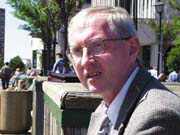You thought you were safe. Jan. 1, 2000 passed you by. No terrorist bombs, no stray missiles from the Ukraine, no wholesale blackout. Time to relax, right?
Not so fast.
John J. Reilly, a Jersey City native, Futurama fan and academic who has studied apocalyptic behavior, recently published Apocalypse & Future: Notes on the Cultural History of the 21st Century (Xlibris Publishing Corp.) He sees the end everywhere.
“If you want to see millennial activities, you’ll see it right on the waterfront,” said Reilly, as he peered out over the Hudson in J. Owen Grundy Park, an old pier that juts out into the water at Exchange Place. “A lot of improvements in America in the ’90s are conceived with eschatological expectations.” (Eschatology is the “science of last things,” and it particularly intrigues Reilly, who also once published a book about the Fair Credit Reporting Act.)
Weren’t a lot of people thinking the world would end a few months ago?
“The number of people who thought that was going to happen was very small,” he said.
A member of the Center for Millennial Studies at Boston University and a self-described “Orthodox Catholic,” Reilly tracks the rapture. From Jonestown to Heaven’s Gate to the Tai Ping rebellion in China to Lord of the Rings, it’s always been with us.
The world should have ended lots of times
History is replete with examples of apocalyptic fervor. Even though the year 1000 came and went, people still fretted over 1030 or 1033 (the approximate anniversary of the death of Jesus). Oliver Cromwell, the leader of a Puritan revolution in England and slaughterer of the Irish, was the head of a “millenarian movement.”
“He violently overthrew the existing order of things for the purpose of instituting a divine order,” Reilly said. But that brings us to another point. While some groups of people dedicated to the apocalypse merely wait for it to happen, he said, others take a more active approach. As we spoke, the United Nations summit was convening on Manhattan’s East Side. Groups gathered to protest, or got together for a glimpse of the “new world order.” But it’s not just nuts and goofballs who fear (or hope) the world’s end. The popularity of the “Left Behind” series of books, now up to its eighth installment, by pastor Tim Lahaye and Jerry B. Jenkins, shows people have an appetite for the rapture. The books explore life in a world ruled by the Antichrist.
“In many cases,” writes Reilly, “apocalyptic novels are fundamentally pastoral tracts that deal with everyday issues.”
And then there’s J.R.R. Tolkien’s tales of hobbits, elves, orcs and wizards.
“Lord of the Rings is a millenarial novel,” said Reilly. “It ends with a golden age, they go through an apocalyptic battle.” And, he notes, any book called “The Return of the King” has to be considered apocalyptic. Then there’s millennial disappointment, in which people hoping for the end of the world get, well bummed out. But not to fear.
“Millennialists don’t go around disappointed,” said Reilly. “They come up with different theories.”
And here some are!
Reilly’s extensive web site provides reviews, his curriculum vitae, and his “metaphysical appearance.” It also has a message that scrolls by at the bottom of the browser:
“What do we want?” it reads.
“DOOMSDAY?”
“When do we want it?”
“NOW!”
The author of the books “Spengler’s Future” and “The Perennial Apocalypse” loves what he does.
But will the world come to end?
“I’m sure,” said Reilly, “Eventually.”
But how soon?
“If you wanted to lay bets? You’d go for 2030, 2033.”
John J. Reilly will be reading from and signing copies of “Apocalypse & Future” at the Book Room, 364 Grove St., Jersey City, on Sun. Sept. 24, 3 p.m. Wine and cheese will be served. Call 795-1911 for more information.
